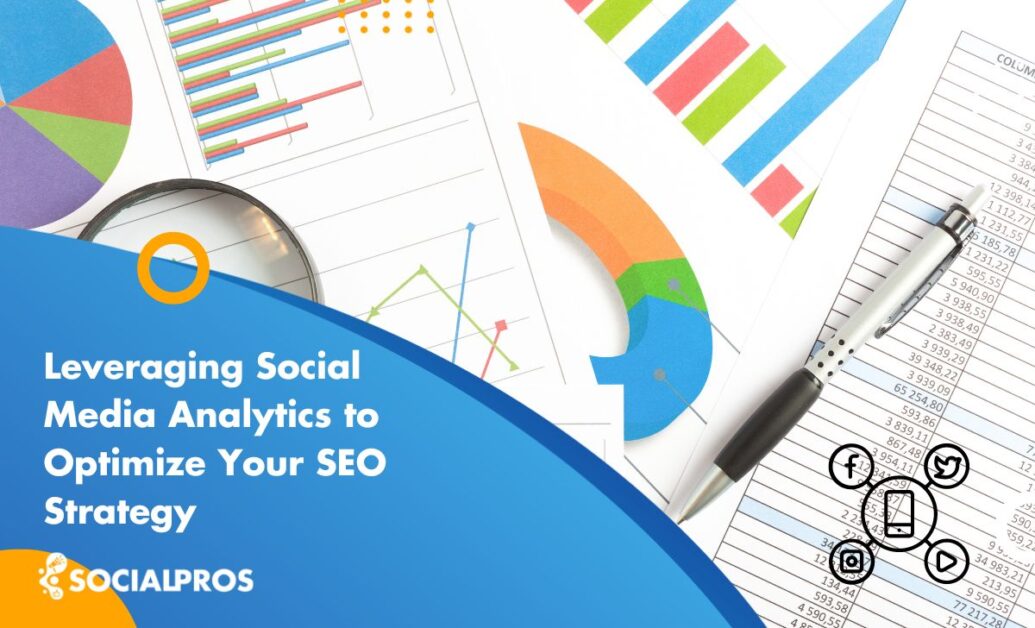Page Contents
In today’s digital landscape, businesses must stay up-to-date with the latest trends and technologies to maintain their online presence. Social media analytics plays a crucial role in understanding user behavior and preferences, which can be used to master social media tactics and optimize your SEO strategy.
In this article, we’ll explore the significance of social media analytics and discuss how to use this data to enhance your professional SEO service offerings. Let’s dive in!
The Importance of Social Media Analytics
Social media analytics plays a crucial role in today’s digital age, as it involves collecting, analyzing, and interpreting data from various social platforms to understand user behavior, preferences, and trends.
This valuable information helps businesses make informed decisions about their digital marketing techniques, including SEO optimization. With the constant evolution of social media platforms, staying on top of these changes is essential for maintaining online visibility and relevance.
By leveraging social media analytics, businesses can gain insights into their target audience’s interests and preferences, enabling them to create more effective and targeted SEO strategies.
Social media analytics helps businesses tailor their content strategies and provides insights into the best times to post content, maximizing reach and visibility. Additionally, monitoring competitors’ social media activity through analytics can uncover social commerce trends and new opportunities.
This competitive intelligence gives businesses an advantage in the crowded digital marketplace. Moreover, social media analytics assists in measuring the effectiveness of social media campaigns by tracking key performance metrics.
Identifying areas for improvement and making data-driven decisions leads to more successful SEO strategies. In conclusion, the importance of social media analytics in today’s digital landscape is undeniable, as it drives growth and success by providing valuable insights.
Identifying Key Social Media Metrics
To optimize your SEO strategy using social media analytics, it’s essential to identify the key metrics that can provide actionable insights. Some important metrics include:
- Engagement rate: This metric measures how actively your audience interacts with your content, including likes, shares, and comments. A higher engagement rate indicates that your content resonates well with your audience.
- Impressions: This metric shows the number of times your content has been displayed to users, regardless of whether they clicked on it or not. Impressions help you gauge the overall visibility and reach of your content.
- Click-through rate (CTR): CTR measures the percentage of users who click on your content after seeing it. A higher CTR indicates that your content is appealing and relevant to your audience.
- Follower growth: Monitoring your follower growth helps you understand the effectiveness of your social media strategy in attracting and retaining your target audience.
- Mentions: This metric tracks the number of times your brand or content is mentioned on social media. Mentions can provide insights into brand awareness and reputation.
- Hashtag performance: Analyzing the performance of specific hashtags can help you identify trending topics and understand which hashtags generate the most engagement for your content.
By monitoring these metrics, you can better understand how your audience interacts with your content and use this information to improve your SEO efforts.
Integrating Social Media Insights with Your SEO Strategy
Once you have gathered insights from social media analytics, it’s time to integrate them into your SEO strategy. This can be done by:
- Identifying popular topics and trends among your audience: Analyze the content that receives the most engagement on social media to identify popular topics and trends within your target market. This information can help you create relevant, engaging content that resonates with your audience.
- Creating keyword-optimized content based on these topics: Use keyword research tools to identify high-performing keywords related to the popular topics and trends you discovered through social media analytics.
Incorporate these keywords into your content to improve your chances of ranking higher on search engine results pages (SERPs).
- Enhancing your website’s user experience (UX) to match audience preferences: Social media analytics can provide insights into the type of content and website features that your audience prefers. Use this information to improve your website’s UX, making it more user-friendly and easier to navigate.
Improving Organic Search Rankings
By analyzing social media metrics, you can identify content that resonates with your target audience. Creating SEO-optimized content around these topics can help improve your organic search rankings, making it easier for users to find your website on search engines.
To further enhance your organic search rankings, consider the following strategies:
- Regularly updating your content: Fresh, up-to-date content is favored by search engines, so make sure to update your website with new and relevant information regularly.
- Optimizing meta tags and title tags: These HTML tags provide search engines with information about your content, helping them understand what your web pages are about. Ensure your meta and title tags are properly optimized with relevant keywords and accurately describe your content.
- Improving site speed: A slow-loading website can negatively impact your search rankings. Optimize your site speed by compressing images, removing unnecessary plugins, and implementing a content delivery network (CDN) if necessary.
Increasing Website Traffic with Tailored Promotion Strategies
Social media analytics can help you create engaging content and understand the best channels and formats for promoting that content.
By tailoring your promotion strategy to match user preferences, you can drive more targeted traffic to your website and boost your overall SEO performance.
To make the most out of your content and increase website traffic, consider the following approaches:
a. Sharing Content Across Multiple Platforms
To maximize your reach, share your content on various social media platforms where your target audience is active. This can attract new visitors and increase your overall website traffic.
When sharing content, consider the unique characteristics of each platform:
- Facebook: Share content in relevant groups and use eye-catching images to capture users’ attention.
- Twitter: Use popular and relevant hashtags to increase the visibility of your content and share multiple times throughout the day to reach users in different time zones.
- LinkedIn: Share content in industry-specific groups and engage with users by asking questions or sharing insights.
- Instagram: Use visually appealing images or videos to promote your content, and include relevant hashtags in the captions. Also, pay attention to the best time to post on Instagram.
By sharing your content across multiple platforms, you can reach a wider audience and drive more traffic to your website.
b. Collaborating with Influencers
Partner with influencers within your niche to promote your content to their followers. This can expand your reach and help drive more traffic to your website. Influencer collaborations can take various forms, such as:
- Guest posts: Write a guest post for an influencer’s blog or invite them to contribute to your own website. This can provide fresh content for both parties and expose your content to a new audience.
- Social media takeovers: Allow influencers to “take over” your social media accounts for a day, sharing their insights and promoting your content to their followers.
- Sponsored posts: Collaborate with influencers to create sponsored content that promotes your brand, products, or services in an authentic and engaging manner.
By partnering with influencers who share your target audience, you can tap into their established network and drive more traffic to your website.
c. Utilizing Paid Advertising
Investing in social media advertising is another effective way to increase the visibility of your content and attract more targeted traffic to your website.
With various ad formats available on different platforms, you can tailor your ads to suit your goals and budget. For example, consider these paid advertising options:
- Facebook Ads: Use Facebook’s advanced targeting options to reach users based on demographics, interests, and behaviors. Create eye-catching ads with engaging images and videos to capture users’ attention.
- Twitter Ads: Promote your tweets to a larger audience using Twitter’s advertising platform. Target users based on their interests, demographics, and their accounts.
- LinkedIn Ads: Reach professionals and decision-makers in your industry by running ads on LinkedIn. Use LinkedIn’s detailed targeting options, such as job title, company size, and industry.
- Instagram Ads: Run visually appealing ads on Instagram to reach users based on their interests, demographics, and behaviors. Use eye-catching images and videos to engage users and drive traffic to your website.
By utilizing paid advertising in combination with organic promotion strategies, you can maximize the visibility of your content and attract more targeted traffic to your website, ultimately boosting your overall SEO performance.
Boosting User Engagement
Creating content that aligns with your audience’s interests makes you more likely to generate higher engagement rates. By leveraging social media analytics to inform your content strategy, you can encourage users to spend more time on your website, positively impacting your SEO.
To boost user engagement, try the following tactics:
- Incorporating visuals: Images, videos, and infographics can make your content more engaging and easier to consume. Use visuals to break up large text blocks and illustrate complex ideas.
- Encouraging user-generated content: User-generated content, such as reviews, testimonials, and social media posts, can encourage engagement and provide social proof for your brand.
- Implementing interactive elements: Interactive elements, such as quizzes, polls, and chatbots, can increase user engagement by encouraging users to interact with your content.
Enhancing Your Link Building Service
Social media analytics can also identify potential partners for your Link Building Service. Finding influencers and websites that share a similar audience allows you to collaborate on content, exchange backlinks, and ultimately strengthen your overall SEO strategy.
To enhance your link-building service, consider these approaches:
- Conducting outreach to relevant websites: Reach out to websites and blogs within your niche to get guest posts published, content collaborations, or backlink exchanges.
- Participating in industry forums and communities: Engage with industry-specific forums and online communities to build relationships and earn backlinks from authoritative sources.
- Creating shareable, link-worthy content: Produce high-quality, informative content that others will want to link to, increasing the likelihood of earning organic backlinks.
Pro Tip: here are five social media SEO tips to boost your online business.
Monitoring and Adjusting Your Strategy
Regularly monitoring and adjusting your social media-driven SEO strategy is vital for success. Consider these key points:
- Utilise Social Media Analytics Tools: Tools like Google Analytics, Hootsuite, and Sprout Social provide valuable insights and help track key metrics.
- Conduct Competitor Analysis: Regularly analyze competitors’ strategies to identify gaps and improvement opportunities in your approach.
- Set SMART Goals: Establish specific, measurable, achievable, relevant, and time-bound goals to maintain focus and measure progress.
- Stay Updated on Industry Trends: Keep up with the latest trends and best practices by attending webinars and conferences and following industry leaders.
- Test and Experiment: Regularly test different tactics to refine your strategy and uncover new growth opportunities.
- Seek Expert Advice: Collaborate with industry experts, participate in online forums, and join professional networking groups for valuable insights and guidance.
You’ll optimize your approach and stay ahead of the competition by consistently monitoring and adjusting your strategy.
Measuring the ROI of Your Social Media Analytics-Driven SEO Strategy
To gauge the success of your social media analytics-driven SEO strategy, measuring the return on investment (ROI) is essential.
By tracking key performance indicators (KPIs), you can determine the effectiveness of your efforts and make data-driven decisions to optimize your strategy. Some important KPIs to track include:
- Organic search traffic: Monitor the number of visitors coming to your website through organic search. An increase in organic search traffic indicates that your SEO strategy is working.
- Bounce rate: The bounce rate represents the percentage of users who leave your website after viewing only one page. A lower bounce rate suggests that your content is engaging and relevant to your audience.
- Conversion rate: This metric measures the percentage of visitors who take a desired action on your website, such as purchasing or signing up for your newsletter. A higher conversion rate indicates that your SEO efforts drive quality traffic to your site.
- Revenue generated: Track the revenue generated from your SEO efforts to calculate the overall ROI of your strategy.
Leveraging social media analytics can significantly impact your SEO strategy. By understanding user behavior and preferences, you can optimize your content, improve organic search rankings, increase website traffic, and boost user engagement.
Conclusion
By integrating these insights into your SEO strategy and offering professional SEO and link-building services, you can ensure that your business remains competitive in the ever-evolving digital landscape. So, why not start harnessing the power of social media analytics today?
FAQs
Now it’s time to go over some frequently asked questions regarding our topic:
What is Meant by Social Media Analytics?
It refer to the process of collecting and analyzing data from social media platforms to gain insights into audience behavior, preferences, and engagement. By analyzing social media data, businesses and organizations can better understand their audience and improve their social media strategies to achieve their goals.
What Are the Types of Social Media Analytics?
There are several types of social media analytics, including:
1. Descriptive analytics: This type of analytics focuses on describing what happened on social media. It includes metrics such as the number of followers, likes, shares, and comments.
2. Diagnostic analytics: Diagnostic analytics helps to explain why something happened on social media. For example, it can help identify why a particular post received more engagement than others.
3. Predictive analytics: This type of analytics uses historical data to make predictions about future behavior. It can help businesses identify trends and make more informed decisions about their social media strategies.
4. Prescriptive analytics: Prescriptive analytics provides recommendations on what actions to take based on the insights gained from social media data. It can help businesses optimize their social media performance and achieve their goals.





